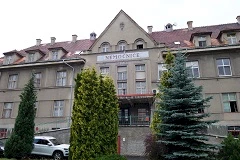Weekly review no. 28
12.04.2024
Funding for eight projects in the Elbe/Labe Euroregion approved
The Elbe/Labe Euroregion manages a small project fund filled with EU funds to support German-Czech projects. At today's meeting of the local steering committee in Děčín, eight project applications with a total funding volume of 69,236.80 euros were approved. These include, for example, holiday camps, sports games, joint excursions or cooperation between dog sports clubs. The applicants came from Sebnitz, Dolní Poustevna, Bad Gottleuba, Tisá, Teplice, Bannewitz, Krásná Lípa, Obercunnersdorf, Bärenstein, Česká Kamenice and Dresden.
You can find out more about the funding opportunities offered by the Small Projects Fund at www.elbelabe.eu/kpf . We would be delighted to receive many good project proposals. Please spread the word!
To the list of approved projects
Ústí District modernizes Rumburk Hospital

Five years ago, the hospital in Rumburk was still a nursing case. Insolvent and threatened with closure. Some departments were closed, there was not only a lack of money, but also of staff. In between there was the takeover by the hospital holding company of the Ústí district and the Covid pandemic, during which the hospital regained importance. Especially since the borders were temporarily closed and patients could no longer be cared for by Saxon clinics as once planned.
The situation for the hospital has now improved. In the coming years, the district will invest heavily again. The equivalent of 37.5 million euros is planned. The money will be used to renovate the polyclinic, i.e. the medical care center. A completely new emergency room will be built and the hospital will finally have its own helipad. The majority of the investments should be completed by 2027. The renovation of the main building will take a little longer.
The hospital, which cares for 50,000 people in the Schluchsee area, was due to be closed years ago. At the same time, negotiations were underway with facilities in neighboring Saxony that were waiting for patients from the Czech Republic. But the plan failed due to lack of funding.
Děčín acquires electric buses
Public transport in Děčín will change in the next few years. This will be achieved by purchasing new electric buses for the city lines. The city has already started a bidding process to purchase 20 electric buses. The first ten buses are expected to be delivered next year. The city will only pay a fraction of the price. The majority will be covered by subsidies from the European Union.
Děčín has been testing electric buses from various manufacturers for three years now. The decisive factor was whether the buses could also handle the mountainous terrain of the Elbe city. The result was positive. The transport company is only expecting one additional quick charge during the day.
Which company ultimately supplies the buses depends solely on the lowest price bid. The city also demands a guarantee for the batteries for the full 12-year lifespan.
In order to reduce emissions, Děčín has already purchased 21 natural gas-powered buses, whose operating costs rose sharply following the price increases after Corona and Russia's war against Ukraine. Děčín also has diesel buses in its fleet.
Unemployment highest in Northern Bohemia
Ústí nL Unemployment in the Ústí region remains the highest in the Czech Republic. In March, the employment offices reported an unemployment rate of six percent. That was two percentage points higher than the national average. However, the rate remained unchanged from February. 33,643 people were registered as unemployed compared to almost 11,000 vacancies.
The affair surrounding Bystron and the Czech newspaper Deník N
AfD politician Petr Bystron has been in the headlines for almost three weeks. He is said to have accepted money from the Russian propaganda portal Voice of Europe. Bystron denies this and the party executive of the Alternative for Germany has expressed its trust in him. But the longer the affair lasts and the more details and new findings become known, the more the politician becomes a burden for the AfD. After all, he is second on the list of candidates for the European elections in June. The name of the Czech newspaper Deník N is always mentioned in connection with Bystron. It was at the beginning and first made the allegations public.
This is no coincidence. After all, Bystron is a politician with Czech roots. Born in Olomouc in 1972, his family emigrated to Germany at the end of the 1980s. For several years now, he has had a meteoric rise in the AfD. Nevertheless, Czech media continue to write the politician's name in Czech. That means Petr remains Petr, but his surname is Bystroˇň, with a soft N at the end. His origins explain the great interest of the media in the Czech Republic in him. However, Czech media have very good sources, especially when it comes to researching Russian influence. Long before Russia's attack on Ukraine, the Czech secret service warned of the threat from Russia and its growing influence not only in the Czech Republic, but also in other parts of Europe. Czech journalists are also among the most active in Europe, researching Russian influence in networks with colleagues from other EU countries. It was no coincidence that a Europe-wide network designed to investigate Russian fake news was headed by a Czech journalist years ago.
Added to this is the long-standing investigative tradition and the growing media landscape in the Czech Republic, which has even grown in the last ten years. Deník N is the best example of this. The daily newspaper was founded when newspapers were closing elsewhere. It originated in Slovakia, where it quickly found readers and subscribers. It was so successful that after years it founded a branch in the Czech Republic. This is what has now set the Bystron affair in motion.
The production of this newsletter is co-financed by tax revenue on the basis of the budget approved by the Saxon State Parliament.
